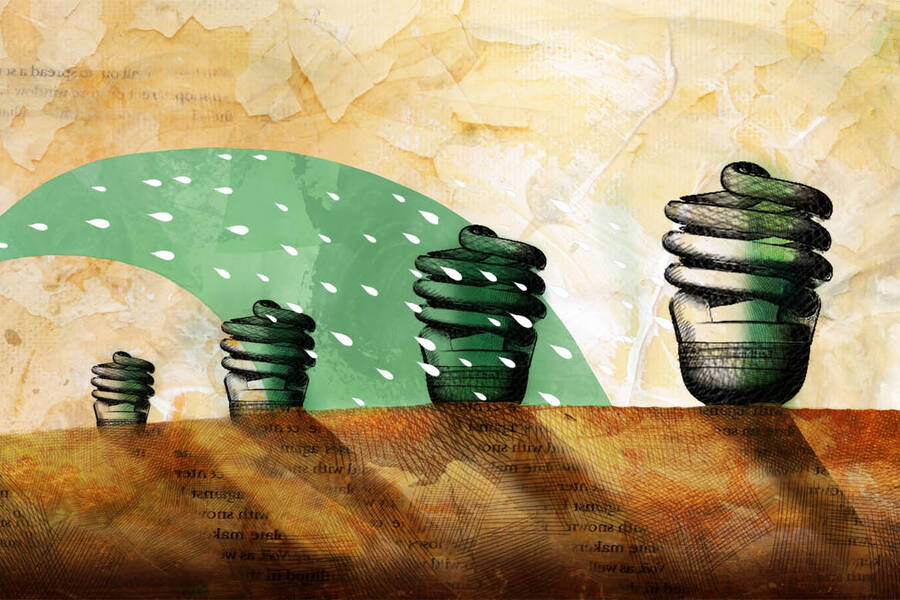But how much do investors, customers, and employees care about these initiatives? Are companies rewarded for their efforts? Here’s a look at research from Kellogg professors that seeks to answer these questions.
1. The Stock Market Rewards Positive ESG News
When a company does good—say, a pledge to go carbon neutral or an initiative to address employee diversity—does the stock market care? That was the question Aaron Yoon, an assistant professor of accounting, and a colleague looked at in recent research.
They analyzed data from more than 3,000 companies and found that stock value did tend to rise after positive news about a firm was made public. But crucially, this only happened if the news was financially material, meaning it related directly to the firm’s industry. So a retailer’s decision to install solar panels at its stores would not be material, but a coffee company’s commitment to pay farmers a fair price for beans would.
Beyond materiality, the researchers found that investors’ reactions changed depending on the category of ESG activities. In general, the strongest positive reactions were to news about how products affected customers, such as changes in safety, affordability, or consumer privacy.
Taken together, the results show that “the market is not viewing ESG as a value-destroying issue,” Yoon says.
2. An Attractive Investment
Investors may also view companies who engage in ESG activities as less risky investments, according to research from finance professor Ravi Jagannathan and colleagues, who looked specifically at the environmental aspectof ESG ratings.
They argue that green companies have the potential to be good investment bets in the long term because they are more likely to outlast sudden industry shake-ups, such as new pollution regulations or consumer-driven demand for more eco-friendly products.
“They can adapt better to these kinds of changes,” Jagannathan says. “Firms that are truly doing better along those dimensions are safer.”
3. Employee Satisfaction Matters
In another research paper, Yoon explored the role of employee satisfaction in whether companies see a benefit from ESG initiatives. He and a colleague conducted an analysis using both data from an ESG ratings firm and data on employee satisfaction from Glassdoor.com.
They then compared the performance of different portfolios of companies. They found that the portfolio of stocks with top ratings in both ESG practices and employee satisfaction generated an alpha of 4.40 percent per year (meaning 4.40 percent in excess of a benchmark return), outperforming the portfolio with the lowest ratings in both categories by 5.61 percent per year. The portfolio also outperformed a portfolio of firms with high employee satisfaction alone by 1.6 percent per year.
This suggests a “synergy between ESG and employee satisfaction,” Yoon says. “In my view, it’s likely that ESG motivates employees and makes them more productive. And it makes a lot of sense: you need hard-working employees who buy into the firm’s vision in order to grow.”
4. Do Consumers Care about Ethical Products?
Investors and employees are one thing, but what about the shoppers at the store. How much do they care about morality when deciding which product to grab? Here, research findings have been mixed, with some researchers dismissing the idea of an ethical consumer altogether.
This prompted Jacob Teeny, an assistant professor of marketing, to dig deeper. Maybe the issue was that morality is very much in the eye of the beholder, he posited. Indeed, in one paper, he and colleagues reviewed previous studies on consumer morality and saw that researchers often assumed that certain product attributes, such as being eco-friendly or cruelty-free, were universally considered moral by consumers. But this is not always the case.
A better approach, he and colleagues discovered in a second piece of research, is to examine the effect of morality on consumer preferences only when the researchers know if the consumer perceives a certain attribute to be moral or not. Results of several studies using this method showed that consumers do, indeed, care if a product feels ethical to them.
“Morality does matter,” Teeny says. “Consumers are consulting their ethical beliefs when they make purchasing decisions.”
Presumably, customers who gravitate toward eco-friendly products still want those products to work. Yet past research has suggested that “green” options are often thought to be inferior to traditional versions, something known as the “sustainability liability.”
Marketing professor Alexander Chernev and a coauthor were skeptical that this sustainability-liability effect is as prevalent as implied by prior research. Across several studies, they found that sustainability is likely to have the opposite effect, strengthening rather than weakening consumers’ product-performance beliefs. They argue that this occurs because sustainability tends to produce a halo effect that can weaken and even override consumers’ belief that sustainability comes at the expense of product performance. They further propose that this halo effect stems from consumers’ evaluation of the moral undertones of the market actions and their view of the company as a moral agent engaged in prosocial behavior.
The researchers argue that these findings suggest two strategies for managers to increase how customers perceive the performance of sustainable products. First, because the sustainability halo stems from people’s beliefs about the company as a moral agent, associating the sustainable benefits with the company rather than with its products can help bolster perceived product performance. Second, emphasizing the societal benefits of sustainability can cause consumers to view the performance of sustainable products as being equal to or even more effective than products made using traditional methods
“This means companies no longer need to avoid investment in sustainable technologies in the mistaken belief that sustainability will hurt the perception of their products,” Chernev says. “Indeed, sustainable products can have a positive impact on sales.”
5. Activist Actions Matter, Too
What about the opposite of all these positive actions? When companies fail to act ethically, do activist campaigns against them—such as customer boycotts—force change, or hurt their bottom line?
This question has long intrigued Brayden King, a professor of management and organizations. In one paper, he looked at how often boycotts are successfulin eliciting a change from the targeted company. The key, he found, was when boycotts garnered national media attention. In those cases, activists got some sort of concession from the company 25 percent of the time.
In later research, he found that, contrary to popular opinion, boycotts didn’t do much in terms of getting customers to abandon a particular product. Instead, activists’ power comes from shining a spotlight on a company, which can make investors wary of potential problems and long-term risks. King and a coauthor found, on average, a 1 percent drop in stock price within a 26-day period of a protest targeting a company.
“Protests are a kind of information signal that cause people to pay attention to an issue, or maybe rethink an issue,” King explains. “It causes investors, policymakers, executives and the general public to look at that organization in a different way.”




